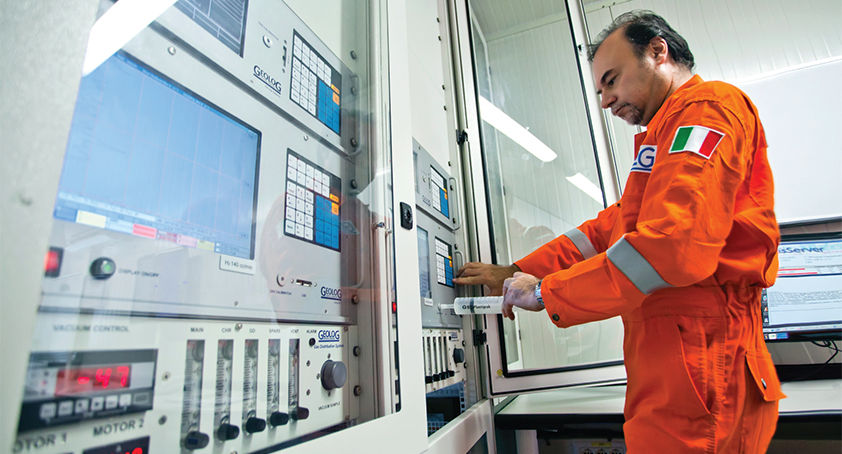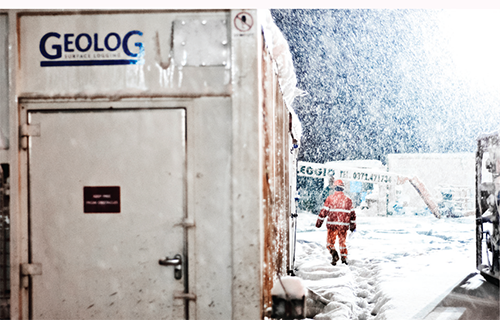
GEOLOG: From Italian Roots to Global Leader in Surface Logging Services
Born on a Volcano
On a sunny day in the summer of 1982 Carlo Bezzola set foot on the island of Vulcano, in the Tirrenian Sea. Unlike most visitors, Carlo was not there for tourism.
In fact, Agip was conducting a geothermal wells campaign on the island and, in order to support the logging of its wells, it had contracted the newly formed company Geolog SpA for the job. Geolog duly sent out Carlo, one of its young geologists, to carry out the task, along with its first surface logging unit.
Thirty years and countless wells after that Italian geothermal adventure, Geolog has become an international player in the oil and gas exploration and drilling business. Today the company, still headquartered in Milan for its technical and production facilities, has corporate offices in Amsterdam, from where international operations are run. With a presence in over 35 countries distributed over six continents, and more than 200 units operating at any given time, Geolog is today one of only a handful of truly global surface logging companies in the world, and the only independent, privately owned one.
Carlo Bezzola is now one of the company’s senior managers and recalls the early days, when the company built its first systems directly following the specifications of Agip, initially Geolog’s sole client. He fondly remembers the company’s early days: “I have fond memories of Guido Panci, the founder of Geolog. I will always be grateful to him for the chance he gave me and for his teachings. I joined the company thinking of myself as a pure geologist and I was quickly transformed into an all-round electrician-plumbermechanic and programmer, which was a very important practical learning experience. Following these beginnings I first realised that Geolog had made it into the global arena when I saw a geologist wearing a Geolog cap in a restaurant in Montevideo, Uruguay. It was the sign of having achieved a global status.”
Amongst the early technologies employed, Carlo remembers some that, at the time, seemed like science fiction, but are today totally obsolete: “The then famous HP 9825 is a good example, as it was the first all-in-one desktop computer. Geolog was amongst the first to introduce it in mudlogging when everyone else was still using electro-mechanical systems. It had an aura of magic around it at the time. Our engineers were able to write a small 4-lines programme and store data on a 250K cassette to create the first ever offline engineering service on a drilling well. It is now showcased at the HP museum!”
 Being an innovator in the industry, Carlo highlights that there are other technologies that Geolog has introduced in the oil field: “Geolog has pioneered flame-ionization gas detectors, which today are an industry standard for gas detection and everybody uses them. But we, naturally, still have the best ones.” As Carlo
Being an innovator in the industry, Carlo highlights that there are other technologies that Geolog has introduced in the oil field: “Geolog has pioneered flame-ionization gas detectors, which today are an industry standard for gas detection and everybody uses them. But we, naturally, still have the best ones.” As Carlo
mentions, the geographical distribution of the company was initially dictated by the ventures of Agip around the world. So the all-Italian Geolog expanded into Venezuela, Tunisia, and Congo during the early nineties, starting up operations that last to date.
The new millennium – Geolog in the world
The new millennium actually started in the worst possible way for Geolog: company founder Guido Panci passed away prematurely in the year 2000. However, his legacy was brought forward by the new company management which, to date, has grown Geolog into one of the most successful and respected service companies in the business.
Antonio Calleri has been at the helm of the company for a decade now. He explains what he found when he first arrived: “I was impressed. I found a series of systems and technologies that were innovative and unique, and that the competition did not have. The chromatography system was more advanced than anything I had seen in the business. They had also developed systems to measure rock mechanics, which are still unique today, and all their engineering software was built in-house, from scratch, instead of adapting existing products as most would do. I stuck to those core competencies because they were a clear technological advantage in a competitive market. My first task was that of industrialising these solutions and introducing them to international clients to expand the company on the global arena.
“I believe there are three main aspects to our success,” he continues. “First is our people. The Geolog family now consists of over 1200 people. Most of them we have picked straight from university; we have trained them and developed
their natural skills as much as we could. Most of our top managers and senior technical figures have come from that method. Second, we believe innovation is the key, particularly today, as we work with our clients in frontier drilling operations. Finally, we have decided to remain focused. We do one job, which is mud logging services, and we do it well. We are entirely focused on it and we want to be the best in the world at it.”
Despite its growth, Antonio explains that Geolog still maintains its Italian roots: “Italian creativity is in the foundations of our industrial culture. We believe that in the competency and ingenuity of some of our suppliers lies the legacy of the Italian geniuses of the Renaissance. A small Leonardo, Michelangelo, or a modern Marconi or Natta is present in the technology solutions we build together with our Italian partners.”
All about technology
From its birth, Geolog has been involved in developing new applications and tools destined to the three main areas of the company’s activity: Sensors to improve drilling efficiency: a good example is the GeoCVM cutting volume monitoring service for real-time detection and monitoring of borehole stability and cleaning. Furthermore, Geolog’s experience in the utilisation of advanced flow detectors has enabled the development of the Flow-Guardian package, which provides accurate and advanced monitoring of the well fluid balance, and early kick detection.
Gas detection and gas analysis: Geolog’s Constant Volume Degasser (CVD) coupled with the fast and high-resolution chromatograph DualFid ™ provides the most accurate gas detection system available on the market. Geolog is at the forefront of gas detection and is constantly developing systems to investigate the gas composition in real time and infer the formation fluid type on-site.
Acquisition, processing and visualisation software: Geolog has developed very flexible and fully configurable well data management software. Since 2007 it has become a provider of real-time data transmission services with its proprietary system Wellcoms, having been aware of the increasing need for taking informed decision at central level within clients operations.
Geolog’s history has been marked by a series of technology milestones. The company prides itself with technological leadership in a field where staying ahead of the competition is the key to survival and success. For example, in 2004 Geolog developed a gas chromatograph which, duly updated with time, is still today a benchmark for gas detection while drilling. Then, in recent years, the R&D efforts of the company have yielded advances in all its main products and services on both the drilling side but also on the reservoir side. Most recently, in 2011 Geolog pioneered Geochemical analysis services at the rig site, bringing to the field analytical instruments that were before only used in remote laboratories.
Clearly, Geolog has become one of the leading names in its field around the world, something that Antonio believes will continue in the future: “There is no question that Geolog will remain a global reality, and that it will continue in the direction of integrating rock and fluid characterisation. It’s a bold objective, but that’s what being a service company is all about.”
Geolog
Services: Surface logging services